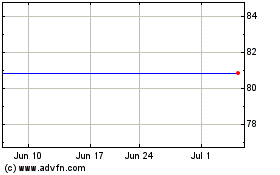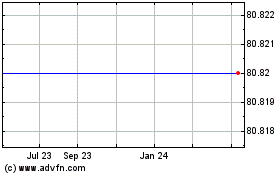Data from St. Jude Medical’s ASSERT Implantable Device Monitoring Study Published in New England Journal of Medicine
January 12 2012 - 10:15AM
Business Wire
St. Jude Medical (NYSE:STJ), a global medical device company,
today announced the publication of results from the ASSERT cohort
study in the New England Journal of Medicine (NEJM). The ASSERT
study, or ASymptomatic AF and Stroke Evaluation in Pacemaker
Patients and the AF Reduction Atrial Pacing Trial, was designed to
determine whether the detection of arrhythmias using
pacemaker-based diagnostics predicts an increased risk of stroke in
elderly, hypertensive patients without any history of atrial
fibrillation (AF).
The study results, previously presented at an American Heart
Association Scientific Sessions meeting, found that pacemaker
patients who have no history of atrial tachycardia (AT) or AF, but
do have device-detected arrhythmias, are approximately 2.5 times
more likely to have a stroke than patients who do not have
device-detected arrhythmias. The trial was sponsored by St. Jude
Medical and was conducted by the Population Health Research
Institute of McMaster University and Hamilton Health Sciences in
Hamilton, Canada.
“Approximately 85 percent of atrial arrhythmias documented in
the study were picked up only by the pacemaker, proving the device
plays a very significant role in identifying patients with a higher
risk of stroke,” said Dr. Jeff S. Healey, principal investigator
for the arrhythmias program at the Population Health Research
Institute. “This monitoring technology is a built-in diagnostic
tool and a huge value-add to further assist physicians in properly
treating their patients.”
The study included 2,580 pacemaker and ICD patients over the age
of 65 with hypertension and no history of AF. Subclinical
(non-symptomatic) atrial tachyarrhythmias detected by implanted
devices occurred in over 10 percent of patients at three months.
The risk of systemic embolism (or stroke) associated with
non-symptomatic atrial tachyarrhythmias was 13 percent. The
diagnostic data and alerts available through St. Jude Medical
implantable devices allow physicians and patients to be notified
whenever a patient experiences significant atrial arrhythmias
(abnormal heartbeats) in the heart's upper chambers, such as AT or
AF.
“The publication of these findings reminds us how important it
is to identify patients with an increased risk of stroke.
Diagnostic tools and remote monitoring capabilities already found
in St. Jude Medical pacemakers and ICDs make it easier for
physicians to capture information to manage AT and AF even when the
arrhythmias are not accompanied by symptoms,” said Dr. Mark
Carlson, chief medical officer and senior vice president of
research and clinical affairs for the St. Jude Medical Cardiac
Rhythm Management Division. “St. Jude Medical is committed to
providing our customers with clinically relevant information that
allows them to deliver more timely and effective care to patients
around the world.”
About Atrial Fibrillation
Atrial fibrillation (AF) is a chaotic, uncontrolled heart
rhythm. It occurs when the upper chambers of the heart (atria)
contract rapidly and irregularly - from 350 to 600 times per minute
compared to a normal heart rhythm of 60 to 100 times per minute. AF
is known to be a common risk factor for, and cause of, stroke.
Because the atria contract so rapidly and irregularly during AF,
the heart cannot beat effectively and blood is not pumped
completely out of the atria. Blood that pools in the atria may clot
and, if the clot moves to an artery in the brain, stroke may occur.
Studies show that AF increases the risk of stroke five-fold. The
risk for stroke related to AF increases with age, and AF
potentially leads to a range of other debilitating symptoms as
well.
About St. Jude Medical
St. Jude Medical develops medical technology and services that
focus on putting more control into the hands of those who treat
cardiac, neurological and chronic pain patients worldwide. The
company is dedicated to advancing the practice of medicine by
reducing risk wherever possible and contributing to successful
outcomes for every patient. St. Jude Medical is headquartered in
St. Paul, Minn. and has four major focus areas that include:
cardiac rhythm management, atrial fibrillation, cardiovascular and
neuromodulation. For more information, please visit sjm.com.
Forward-Looking Statements
This news release contains forward-looking statements within the
meaning of the Private Securities Litigation Reform Act of 1995
that involve risks and uncertainties. Such forward-looking
statements include the expectations, plans and prospects for the
Company, including potential clinical successes, anticipated
regulatory approvals and future product launches, and projected
revenues, margins, earnings and market shares. The statements made
by the Company are based upon management’s current expectations and
are subject to certain risks and uncertainties that could cause
actual results to differ materially from those described in the
forward-looking statements. These risks and uncertainties include
market conditions and other factors beyond the Company’s control
and the risk factors and other cautionary statements described in
the Company’s filings with the SEC, including those described in
the Risk Factors and Cautionary Statements sections of the
Company’s Annual Report on Form 10-K for the fiscal year ended
January 1, 2011 and Quarterly Report on Form 10-Q for the fiscal
quarter ended October 1, 2011. The Company does not intend to
update these statements and undertakes no duty to any person to
provide any such update under any circumstance.
SJM (NYSE:STJ)
Historical Stock Chart
From Jun 2024 to Jul 2024

SJM (NYSE:STJ)
Historical Stock Chart
From Jul 2023 to Jul 2024
